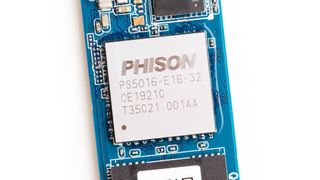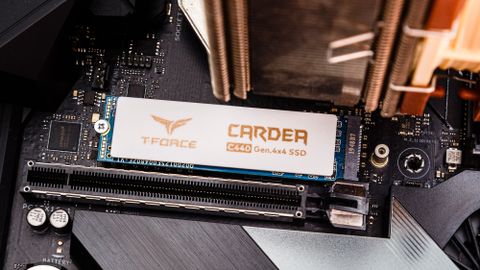Why you can trust Tom's Hardware
Team Group’s T-Force Cardea Ceramic C440 takes a rather unusual approach to taming the heat output from Phison’s Gen4 PS5016-E16 NVMe SSD controller. With a piece of composite ceramic material keeping it cool, the SSD delivers awesome performance, while both keeping and looking cool. You won’t need to hide this SSD under your heatsink to get the most out of it. Even with minimal airflow, temperatures should be of little or no concern when it becomes the storage centerpiece in your system.

The Team Group T-Force Cardea Ceramic C440 won’t typically slow down to extreme levels like some of the lower-end SSDs we have tested. It even outperforms almost every Gen3 SSD there is. While Samsung’s 970 PRO can keep up in hard workloads with its MLC V-NAND and lack of pSLC cache for consistency, the Phison E16 is still tweaked to beat it in most workloads thanks to its highly-responsive sequential bandwidth. And along with that, it delivers very good random performance for responsive behavior in average day-to-day use. Team Group’s T-Force Cardea Ceramic C440 is a fantastic SSD for gamers, storage enthusiasts, and prosumers alike.
And performance isn’t the only selling point. TThanks to Phison’s fourth-generation LDPC ECC working its magic, Team Group’s T-Force Cardea Ceramic C440 comes backed by some incredible endurance ratings, too. With the ability to sustain up to 1.8PB of writes at 1TB or double that to 3.6 PB if you’re able to afford the 2TB model, Team Group’s Cardea Ceramic C440 is a workhorse that will keep on going even after hammering it for days on end within its five-year warranty.
The Cardea Ceramic C440 is priced on the higher side compared to most Gen3 SSDs, but the device is rather competitive as a Gen4 SSD. It costs significantly less than the Samsung 970 PRO as well as the Seagate FireCuda 520 at both capacity points. That said, Corsair’s MP600 is roughly the same price. The Corsair has the advantage if the white heat spreader on the C440 isn’t to your taste, and of course, it also supports encryption for those who need the extra security. But for those wanting a Gen4 NVMe SSD to complement their fancy new white-themed build, Team Group’s T-Force Cardea Ceramic C440 is a good choice. We just wish it came with a black or white PCB to add more to its aesthetic appeal.
MORE: Best SSDs
MORE: How We Test HDDs And SSDs
MORE: All SSD Content

Sean is a Contributing Editor at Tom’s Hardware US, covering storage hardware.
-
alithegreat Hello,Reply
That certainly won’t matter to everyone, but you’ll need to look elsewhere for a black PCB.
I think it shouldn't be a minus in that case. I for one never cared about RGB or colors, they sit inside a computer case which nobody stares while i am using my pc. I can't even see it if i wanted to , while using my pc.. I guess it's like showing off with your car these days, anyway.
So maybe aesthetic concerns should be highlighted in a different way? Maybe a blue :D color text? So people know it's highly subjective rather than data based.
Thanks, -
seanwebster Reply
Hi,alithegreat said:Hello,
I think it shouldn't be a minus in that case. I for one never cared about RGB or colors, they sit inside a computer case which nobody stares while i am using my pc. I can't even see it if i wanted to , while using my pc.. I guess it's like showing off with your car these days, anyway.
So maybe aesthetic concerns should be highlighted in a different way? Maybe a blue :D color text? So people know it's highly subjective rather than data based.
Thanks,
I disagree. While this point is subjective on the buyer, the thing is most M.2s, let alone high-end SSDs come with black PCBs. Even PSUs have black PCBs and they are well hidden. I would argue that it's not just a personal opinion, it's objective considering the state of the market at this point. Considering an M.2 like this will have to do without the mobo heatsink, the blue sticks out like a sore thumb for anyone who cares about tying together the looks of their build. Many enthusiasts tend to buy cases with glass panels/windows to see the insides, which is why RGB has blown up.
It doesn't matter to those pinching pennies, sure, but if you're paying a premium for a Gen4 SSD already, why wouldn't you want a PCB that actually matches the rest of your system? The company's own entry-level models even sport black PCBs. For a high-end option to not feature it, there is no excuse, it's a con for me. Also, most people I have spoken to about it agree that when it comes to actually making a purchase decision, they will more often than not opt for an SSD with a black PCB more than blue or green. Besides, the cost difference is under a dollar per piece from what I remember for DRAM. M.2s are even smaller, so the cost difference is minimal, especially, once again, for an already high-end built SSD with a heat spreader tacked on.
It has been in part my consistent complaining about non-black PCBs for years since SSDs first released that has pushed manufacturers to implement black PCBs in the first place. ;) -
Red_Viper_Martell If you're looking to compare this Cardera SSD to Samsung's 980 Pro (like I was), the Team Group Ceramic C440 1TB is included in the benchmark tables in the article for the 980 Pro itself. Not really sure why Sean wouldn't have the 980 Pro here. From a brief scan, the 980 Pro wins in most categories, except price.Reply
Edited to note: This article reports a peak controler temp of 80℃ v.s. 85℃ on the 980 Pro. I would guess that the thermal conductivity of the thermal pad is a limiting factor. -
seanwebster Reply
This review was submitted before the Samsung embargo.Red_Viper_Martell said:If you're looking to compare this Cardera SSD to Samsung's 980 Pro (like I was), the Team Group Ceramic C440 1TB is included in the benchmark tables in the article for the 980 Pro itself. Not really sure why Sean wouldn't have the 980 Pro here. From a brief scan, the 980 Pro wins in most categories, except price.
Edited to note: This article reports a peak controler temp of 80℃ v.s. 85℃ on the 980 Pro. I would guess that the thermal conductivity of the thermal pad is a limiting factor.

